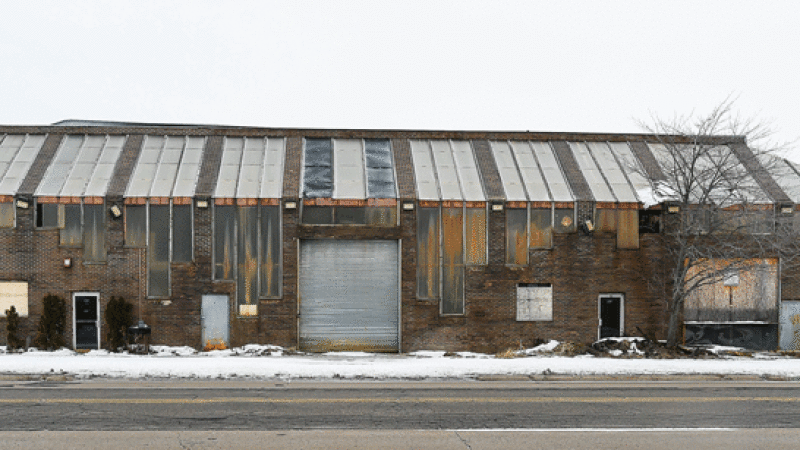Electro-Plating Services, pictured here in February 2019, is set to be demolished. The shuttered factory was the source of the infamous “green ooze” that leaked onto Interstate 696 shortly before Christmas in 2019, and had already been closed previously due to other safety hazards inside.
MADISON HEIGHTS — In December 2019, before the pandemic turned the world on its ear, Madison Heights found itself in the national spotlight when green-colored groundwater laced with cancer-causing hexavalent chromium gushed onto Interstate 696.
Now, the source of those toxins — the shuttered Electro-Plating Services, at 945 E. 10 Mile Road — is finally set to be demolished.
The Madison Heights City Council has awarded the contract for the job to The Adams Group, based in Rochester Hills, for $412,154. The council unanimously approved the decision Feb. 28. At press time, the demolition process was set to begin in late April with asbestos abatement. The actual building was scheduled to come down in May. Melissa Marsh, the city manager, noted in an email that the final price will be determined by the quantities for disposal.
“(The Adams Group) were the most qualified lowest bidder, with a very good safety record,” Marsh said. “They clearly understood the needs of this project, and provided a quote that was the most fiscally responsible for the city.”
The cost of the demolition will be covered by two grants totaling $750,000, which includes $150,000 from Oakland County, and $600,000 from the Michigan Department of Environment, Great Lakes and Energy (EGLE).
When the “green ooze” started gushing onto the highway before Christmas in December 2019, departments at all levels of government united to get it quickly under control.
Officials also repeatedly assured the public that the area’s drinking water had not been compromised since the drinking water is channeled through impervious pipes under high pressure from a sealed municipal source. The contaminants were also rolling downhill, toward the highway the business overlooks, and away from homes and businesses. While some of it would’ve gone into the drains on I-696, those drains were vacuumed, and anything that made it downstream to Lake St. Clair would have been heavily diluted by that point.
Still, there remained the matter of Electro-Plating Services, where the owner, Gary Sayers, had illegally dumped chemicals in a hand-dug pit in the basement, which then leeched into the earth and mixed with groundwater, creating the foul substance.
The business was shut down by regulators in November 2016. The order followed a joint inspection between the Madison Heights Fire Department and the state, where they found an estimated 5,000 containers of hazardous waste, hazardous materials and unknown contents, many of them improperly stored, unlabeled, open and corroded, or in poor condition. Spills were found throughout the facility, and waste was stockpiled in disarray, including highly flammable materials.
The building itself was severely dilapidated, with blocked exits posing fire hazards to workers, and numerous unsecured entry points leaving the building open to vandals. At the time, there was also a risk that the combination of cyanide and hydrochloric acid on-site, together with large amounts of water, could produce a highly toxic cloud of hydrogen cyanide in a high-density area.
The building is located within 500 feet of residential neighborhoods, and within a one-mile radius of the intersection of interstates 696 and 75, which serves 350,000 vehicles per day. It is also near day care centers, schools and senior living facilities.
In November 2019, Sayers was convicted of illegally storing hazardous chemicals and sentenced to one year in federal prison. He served part of his sentence at the Morgantown Federal Correctional Institute in West Virginia, and was released from prison and ordered to home confinement, as well as payment of $1.4 million in restitution.
To date, the U.S. Environmental Protection Agency has already invested $3.1 million in cleanup at the site. In January 2022, the EPA reported that there were no longer excessive levels of contaminants migrating off-site.
Once the factory is demolished and the site is cleared, EGLE will further assess the site, and implement a plan to remediate any remaining contamination.
Jill Greenberg, spokesperson for EGLE, said in an email that residents can continue to rest assured that their drinking water is safe.
“The groundwater in this area is not used for drinking, cooking or bathing. Madison Heights has tested its drinking water and found no contaminants at levels of concerns. Testing also has been conducted by every U.S. drinking water system with intakes on Lake St. Clair and the Detroit River. None showed contaminants exceeding drinking water criteria. In addition, air quality monitoring has not identified any hazards,” Greenberg said. “Ongoing mitigation efforts involve in-situ, or in-place, treatment of groundwater contamination at the site.”
Roslyn Grafstein, the mayor of Madison Heights, said in a statement that she and the council are grateful to everyone who came together to support the cleanup process.
“The safety of our city’s residents is a concern for the entire region,” Grafstein said, “and we’re happy to see that the city can depend on our elected officials at all levels to have our back when it’s most essential.”


